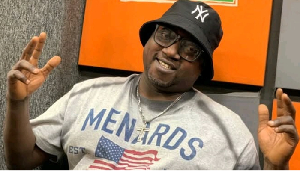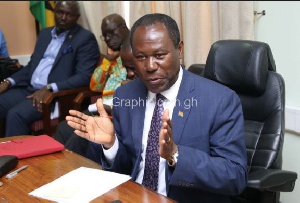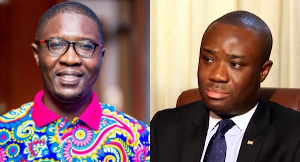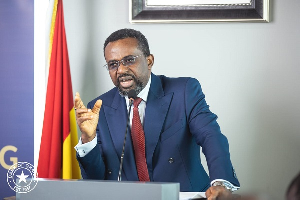Ghana Cocoa Board (COCOBOD) has been instructed to complete investigation into the missing documents and those tampered with in the custody of the Cocoa Research Institute of Ghana (CRIG) in two weeks.
The Accra High Court that gave the directive on Monday, January 21, 2019 insisted that COCOBOD files the report of the committee in court on 5th February. The documents have been described as “germane” by defendants counsel in the trial of Dr. Stephen Opuni and Seidu Agongo.
Dr Opuni, a former Chief Executive Officer (CEO) of COCOBOD, and Agongo, the CEO of Agricult Ghana Limited, are on trial for allegedly engaging in acts that incurred financial loss of GH¢271.3m in a series of fertiliser deals.
What has been a major bone of contention since the case started is whether or not the Lithovit Foliar Fertiliser (LFF), which is the subject matter of the trial, was liquid or powdery in nature.
Meanwhile, the documents, that have been a subject of interest to the court, include an invoice attached to the letter of 20th November 2014, an evaluation report on Codapec/Hitec products submitted to COCOBOD per CRIG letter CRG27/118/4643 dated 31st August 2016. The other is a report on the analysis of two granular fertiliser samples in a rice sack submitted to the Chief Executive on the 24th of October 2016 by a letter with reference number CRG39/14Vol22/5577. There is also another letter dated October 21, 2014.
Deputy Director of Legal at COCOBOD, Mr Johannes Velba had told the High Court in December 17, 2018 that COCOBOD has set up a committee to investigate the circumstances surrounding the disappearance of the documents.
Before the trial commenced on Monday at the court, counsel for second and third defendants Benson Nutsukpui and counsel for Dr. Opuni, the first defendant, Samuel Cudjoe requested for update on the committee’s report.
Mr. Velba informed the court presided over by Mr. Justice Clemence Honyenuga, a justice of the Court of Appeal with additional responsibility as a High Court judge that the committee was yet to “finish its work”.
“Even though they are about to complete their work, they have not been able to find the document and they are not able to unravel the circumstances leading to its disappearance; my lord we await the final report,” he said.
When asked how soon he thinks the report would be ready, he said he believes it would be ready in two weeks’ time, noting that the committee is sitting in Tafo in the Ashanti region where CRIG is based.
Though the case proceeded with the cross-examination of the third prosecution witness, Dr Alfred Arthur, who is the Acting Head of the Soil Science Division of CRIG, lawyer Nutsukpui pointed out that since the committee’s report on the tampered document was not ready, it will be unfair to the court “if we close the cross examination without it”.
The case was adjourned to February 6 with explicit instruction from Justice Clemence Honyenuga to Mr. Velba to ensure that the committee “speeds up” its work and complete investigation into the matter latest by February 4.
The Cocoa Research Institute of Ghana was therefore directed to file the report before the court on February 5 before the next adjournment date.
PROCEEDINGS
Mr. Nutsukpui in the course of the cross-examination accused the Director of Public Prosecutions (DPP), Mrs Yvonne Atakora Obuobisa of “interestingly” trying to “gag” a state witness from “answering questions on official documents”.
The witness, Dr. Alfred Arthur, had been presented with a set of documents filed by COCOBOD on 19th December 2018.
Dr. Arthur has given witness to back prosecution’s case that the fertilizer in question was not liquid. He was therefore asked to examine the documents and confirm to the court on his earlier position that CRIG never described litovite as litovite liquid fertilizer.
He maintained his position that CRIG never tested any fertilizer as litovite liquid fertilizer.
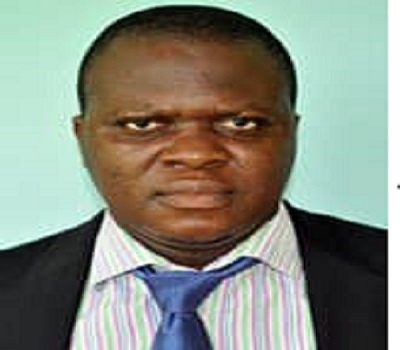
The witness also admitted knowing Dr Anim Kwapong whom he said was the Executive Director of CRIG from September 2014 to February 2017. But when his attention was drawn to the fact that in Dr. Kwapong’s handing over notes, it was stated that during his tenure, renewal of certificate and agrochemicals were done, he said he was not aware.
He further maintained his position that he was unaware that certificates of litovite fertilizer were renewed in 2016 for the 2017 season
Dr. Arthur later admitted appearing for the Adu Ampomah committee that was set up in 2017 to investigate the case which is now in court, but said he never saw the report of the committee. He said he was therefore not in position to tell if the report is different from his assertion that Mr A.A Afrifa, the former Head of the Soil Science Division of CRIG and one J.H Dogbatse said Duapa fertilizer was not tested.
On documents filed by CRIG on 11th December 2018 pursuant to the orders of the court, the witness acknowledged that they were filed by COCOBOD with the stamp of its legal department.
When asked by lawyer Nutsukpui that the first, among a pile of documents, has its last paragraph quoting “Lithovit liquid fertilizer”, Dr. Arthur responded in the affirmative.
But the Director of Public Prosecutions (DPP), Mrs Yvonne Atakora Obuobisa stood up and objected to the line of questioning and demanded it is expunged.
She argued that the documents were authored by other scientist and not the witness, therefore he cannot testify to matters he knows nothing about and cannot answer questions on, accusing the defence counsel of trying to “smuggle” in the documents.
Benson Nutsukpui however clarified that it was not stated that the witness authored the documents, but after his ability to identify the documents, the question was only to show the relevance of the documents.
The function of the prosecutor is a public duty, Mr Nutsukpui averred in reference to a Supreme Court ruling, pointing out that it is the duty of the prosecution to provide any necessary documents to confirm the quilt or innocence of the accused.
But the judge noted that since the witness denied that the fertilizer was liquid, counsel for the 2nd and 3rd accused should have tendered the documents in evidence so as to be fair and just to the witness who did not author the documents.
After laying foundation for his ruling, Justice Clemence Honyenuga disallowed the question and expunged it “on grounds of fairness”.
General News of Monday, 21 January 2019
Source: 3news.com
We can’t find missing documents in Opuni’s trial – COCOBOD tells court
Entertainment
